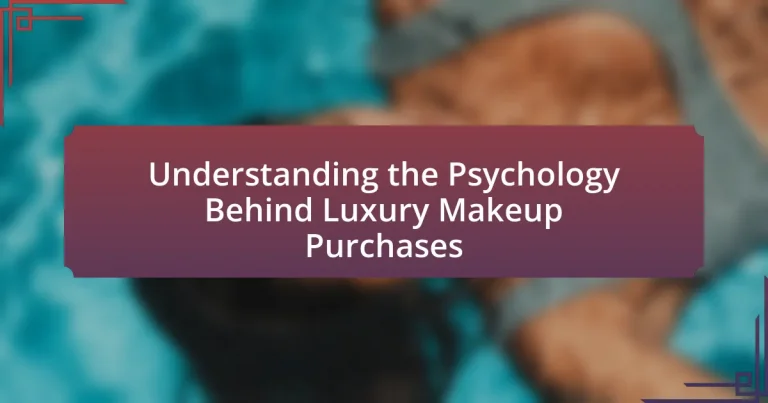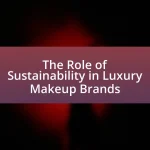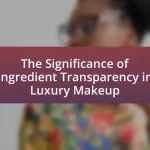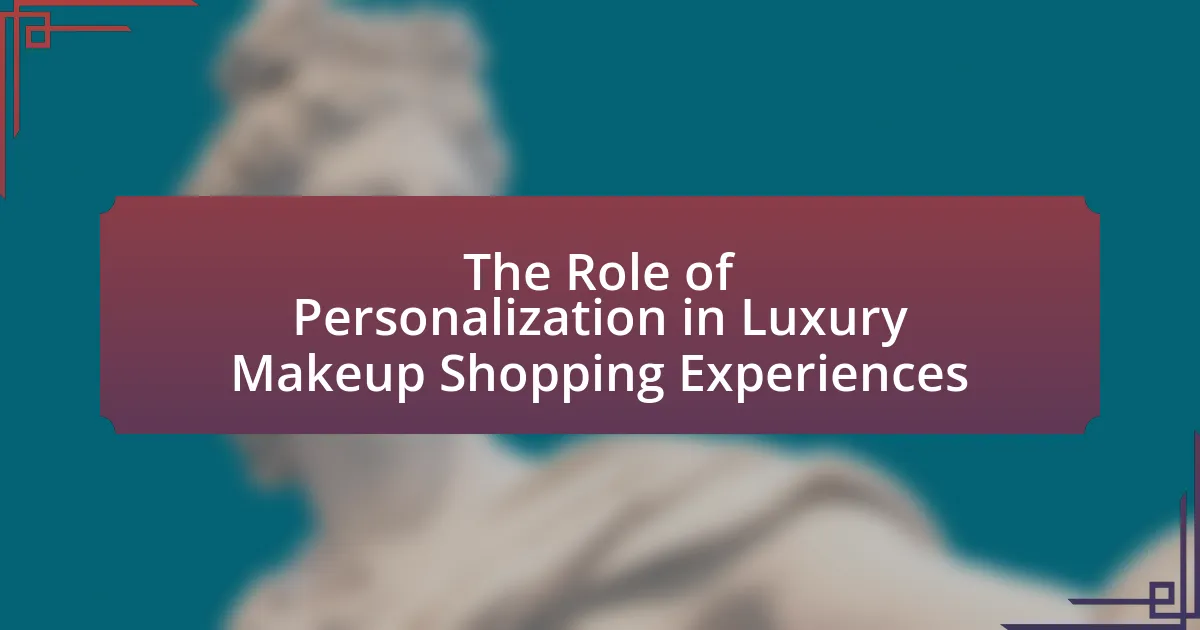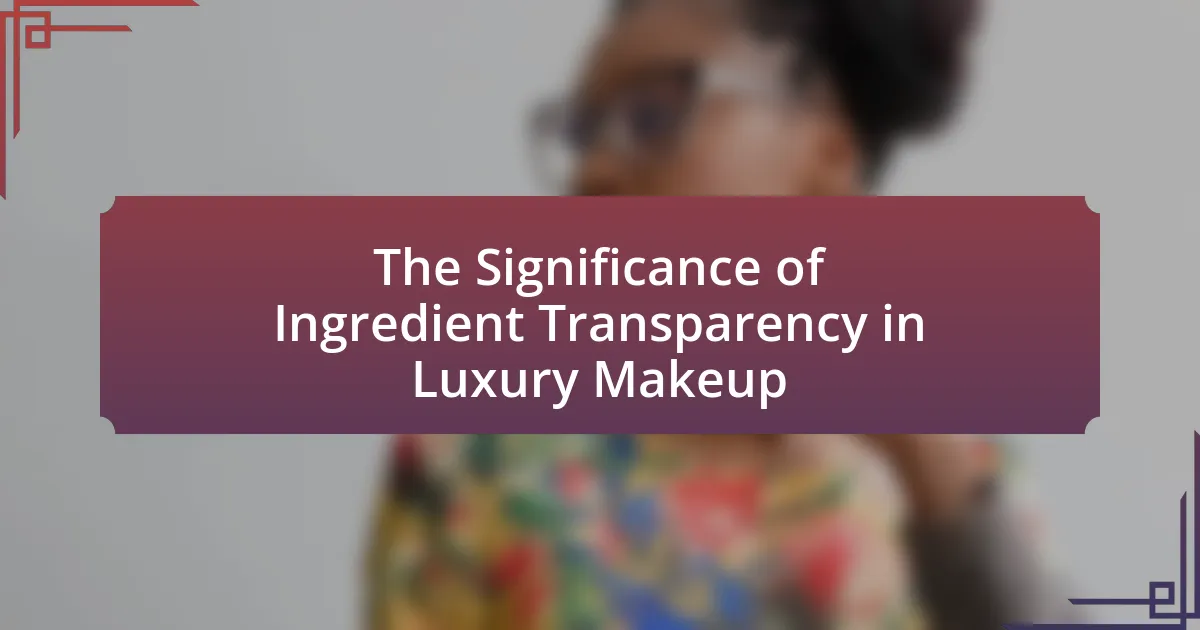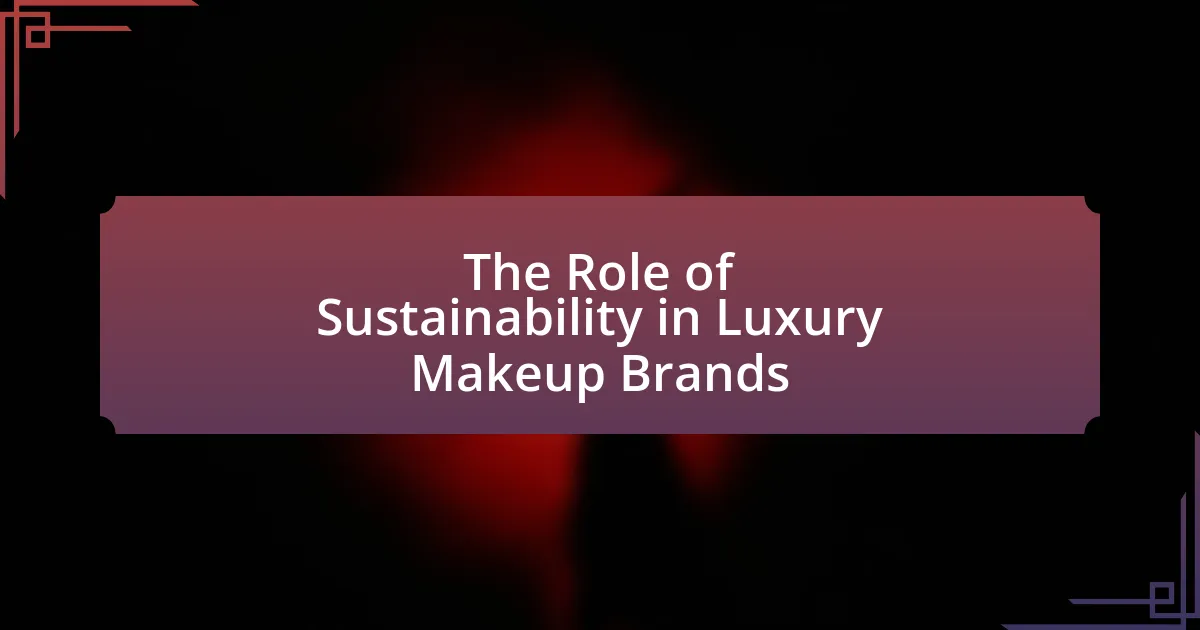The article explores the psychology behind luxury makeup purchases, highlighting the factors that drive consumer behavior in this market. It examines the perceived quality and status associated with high-end brands, the influence of social status and peer perception, and the emotional benefits consumers seek from luxury products. Additionally, the article discusses the role of marketing strategies, including influencer endorsements and advertising, in shaping consumer perceptions and purchasing decisions. Trends in consumer behavior, such as the growing demand for sustainability and personalization, are also analyzed, providing insights into the evolving landscape of luxury makeup consumption.
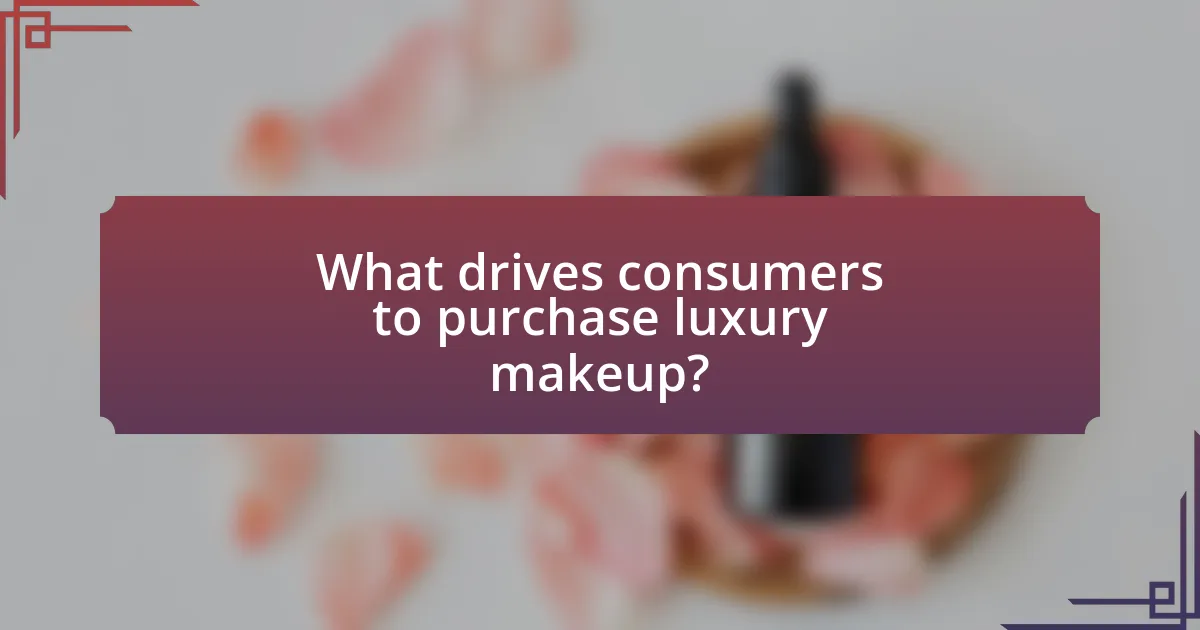
What drives consumers to purchase luxury makeup?
Consumers are driven to purchase luxury makeup primarily due to the perceived quality and status associated with high-end brands. Research indicates that luxury makeup products often utilize superior ingredients and innovative formulations, which enhance the user experience and effectiveness. Additionally, the allure of exclusivity and brand prestige plays a significant role; consumers often associate luxury makeup with social status and personal identity. A study published in the Journal of Consumer Research highlights that consumers are willing to pay a premium for products that signal wealth and sophistication, reinforcing their self-image and social standing.
How does social status influence luxury makeup purchases?
Social status significantly influences luxury makeup purchases by shaping consumer perceptions and motivations. Individuals with higher social status often seek luxury makeup as a means of signaling wealth and exclusivity, which reinforces their social identity. Research indicates that consumers in higher socioeconomic brackets are more likely to invest in premium beauty products, as they associate these items with enhanced social standing and prestige. For instance, a study published in the Journal of Consumer Research found that luxury brands are perceived as status symbols, leading affluent consumers to prioritize these products to maintain or elevate their social image.
What role does peer perception play in these purchases?
Peer perception significantly influences luxury makeup purchases by shaping consumer attitudes and behaviors. When individuals perceive that their peers value or endorse certain luxury makeup brands, they are more likely to purchase those products to align with social norms and gain social acceptance. Research indicates that social influence can lead to increased desirability of luxury items, as consumers often seek to enhance their social status through their purchases. For instance, a study published in the Journal of Consumer Research found that individuals are more inclined to buy luxury goods when they believe their peers will approve, highlighting the powerful role of peer perception in driving these purchasing decisions.
How do luxury brands enhance social status through their products?
Luxury brands enhance social status through their products by creating an aura of exclusivity and prestige. This is achieved through high-quality materials, meticulous craftsmanship, and limited availability, which signal wealth and sophistication to others. For instance, brands like Chanel and Louis Vuitton often employ scarcity tactics, such as limited edition releases, which increase desirability and elevate the perceived social standing of their consumers. Additionally, luxury brands invest heavily in marketing strategies that associate their products with high-profile celebrities and influencers, further reinforcing the idea that ownership of these products is a marker of elite status. Research indicates that consumers often derive self-esteem and social validation from luxury purchases, as demonstrated in studies published in the Journal of Consumer Research, which highlight the psychological benefits of owning luxury items.
Why do consumers associate luxury makeup with quality?
Consumers associate luxury makeup with quality primarily due to the perception of superior ingredients and craftsmanship. Luxury brands often invest in high-quality formulations, which can lead to better performance and results, such as longer wear and enhanced pigmentation. Additionally, luxury makeup brands typically emphasize exclusivity and prestige, which reinforces the belief that higher price points correlate with higher quality. Research indicates that consumers are willing to pay more for products they perceive as premium, as evidenced by a study published in the Journal of Consumer Research, which found that consumers often equate higher prices with better quality. This psychological association is further supported by marketing strategies that highlight the luxurious experience and status associated with these products.
What factors contribute to the perception of quality in luxury makeup?
The perception of quality in luxury makeup is primarily influenced by brand reputation, product formulation, packaging, and marketing strategies. Brand reputation plays a crucial role, as established luxury brands often have a history of quality and exclusivity, which consumers associate with superior products. Product formulation is significant; high-quality ingredients and innovative formulations enhance performance and user experience, leading to a perception of luxury. Packaging also contributes, as elegant and sophisticated designs signal premium quality and attention to detail. Lastly, effective marketing strategies, including endorsements by influencers and high-profile advertising campaigns, reinforce the perception of quality by creating an aspirational image around the brand.
How does brand reputation affect consumer trust in luxury makeup?
Brand reputation significantly influences consumer trust in luxury makeup by establishing credibility and perceived quality. A strong brand reputation signals to consumers that the products are reliable and of high quality, which is crucial in the luxury segment where consumers expect premium experiences. Research indicates that 70% of consumers are willing to pay more for products from brands they trust, highlighting the direct correlation between brand reputation and consumer willingness to invest in luxury makeup. Additionally, luxury brands often leverage their reputation through endorsements and high-profile marketing, further reinforcing consumer trust and loyalty.
What psychological needs are fulfilled by luxury makeup purchases?
Luxury makeup purchases fulfill several psychological needs, primarily including self-esteem enhancement, social status signaling, and emotional gratification. Consumers often buy luxury makeup to boost their self-image and confidence, as high-end products are associated with quality and exclusivity. Research indicates that individuals derive pleasure and satisfaction from the act of purchasing luxury items, which can lead to temporary emotional uplift. Additionally, luxury makeup serves as a means of social signaling, where ownership of prestigious brands communicates wealth and sophistication to others, fulfilling the need for social acceptance and belonging. These psychological motivations are supported by studies showing that luxury goods can enhance perceived social status and personal identity.
How does self-esteem relate to luxury makeup consumption?
Self-esteem significantly influences luxury makeup consumption, as individuals with higher self-esteem are more likely to invest in premium beauty products. Research indicates that luxury makeup serves as a tool for enhancing self-image and confidence, particularly among consumers who associate high-quality products with personal worth. A study published in the Journal of Consumer Research found that individuals often use luxury items, including makeup, to signal status and enhance their self-perception, reinforcing the connection between self-esteem and consumption patterns.
What emotional benefits do consumers seek from luxury makeup?
Consumers seek emotional benefits from luxury makeup primarily to enhance their self-esteem and confidence. The use of high-end makeup products often leads to feelings of empowerment and satisfaction, as these products are associated with quality and exclusivity. Research indicates that luxury items, including makeup, can evoke positive emotions and a sense of belonging, as consumers often perceive them as symbols of status and success. Additionally, the ritual of applying luxury makeup can serve as a form of self-care, promoting relaxation and personal expression, which further contributes to emotional well-being.
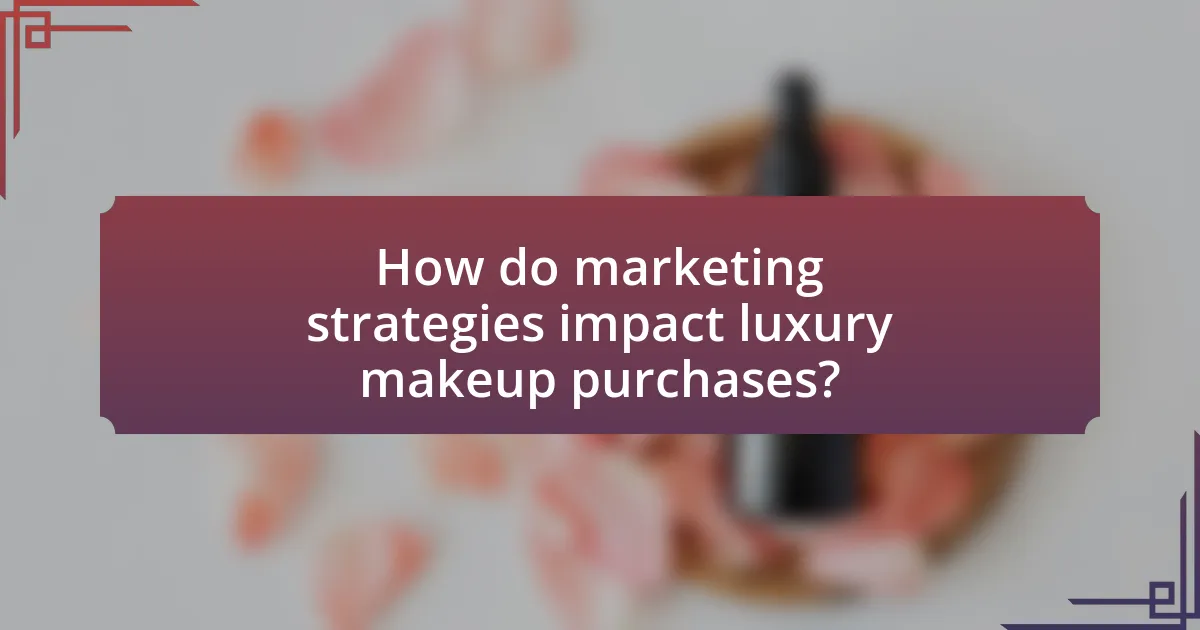
How do marketing strategies impact luxury makeup purchases?
Marketing strategies significantly influence luxury makeup purchases by shaping consumer perceptions and driving brand desirability. Effective marketing tactics, such as influencer partnerships and targeted advertising, create a sense of exclusivity and aspiration around luxury makeup brands. For instance, a study by McKinsey & Company found that 70% of consumers are influenced by social media when making luxury purchases, highlighting the power of digital marketing in this sector. Additionally, luxury brands often employ storytelling and emotional branding to connect with consumers, enhancing their willingness to pay premium prices. This strategic approach not only elevates brand image but also fosters customer loyalty, ultimately impacting purchasing decisions in the luxury makeup market.
What role does advertising play in shaping consumer perceptions?
Advertising plays a crucial role in shaping consumer perceptions by influencing how individuals view products and brands. Through strategic messaging, visuals, and emotional appeals, advertising creates associations between luxury makeup products and desirable attributes such as quality, status, and beauty. For instance, a study published in the Journal of Consumer Research found that advertisements that evoke emotional responses can significantly enhance brand perception and consumer loyalty. This demonstrates that effective advertising not only informs consumers but also shapes their attitudes and beliefs about luxury makeup, ultimately guiding their purchasing decisions.
How do luxury brands create aspirational imagery in their marketing?
Luxury brands create aspirational imagery in their marketing by utilizing high-quality visuals, exclusive storytelling, and celebrity endorsements. These brands often showcase their products in luxurious settings, emphasizing craftsmanship and exclusivity, which appeals to consumers’ desires for status and prestige. For instance, brands like Chanel and Louis Vuitton frequently feature their products in glamorous advertisements that highlight a lifestyle of wealth and sophistication. This strategy is supported by research indicating that aspirational marketing can significantly influence consumer behavior, as it aligns with individuals’ self-image aspirations and social identity.
What psychological tactics are used in luxury makeup advertising?
Luxury makeup advertising employs several psychological tactics to influence consumer behavior, including the use of exclusivity, aspirational imagery, and social proof. Exclusivity creates a perception of rarity and desirability, making consumers feel special when they purchase these products. Aspirational imagery showcases idealized beauty standards and lifestyles, encouraging consumers to associate the product with their self-image and aspirations. Social proof is utilized through endorsements by celebrities and influencers, which enhances credibility and encourages potential buyers to emulate those they admire. These tactics are effective in driving luxury makeup purchases by appealing to consumers’ emotions and desires for status and belonging.
How does influencer marketing affect luxury makeup buying behavior?
Influencer marketing significantly impacts luxury makeup buying behavior by enhancing brand visibility and credibility. Research indicates that 49% of consumers rely on influencer recommendations when making purchasing decisions, particularly in the luxury sector where trust and authenticity are paramount. Influencers often create aspirational content that resonates with their followers, leading to increased desire for luxury makeup products. Additionally, a study published in the Journal of Business Research found that influencer endorsements can elevate perceived value and desirability of luxury brands, ultimately driving higher sales.
What impact do social media influencers have on consumer choices?
Social media influencers significantly impact consumer choices by shaping perceptions and driving purchasing decisions. Research indicates that 49% of consumers rely on influencer recommendations when making purchase decisions, particularly in the beauty and luxury makeup sectors. Influencers create a sense of trust and relatability, which enhances their ability to sway consumer behavior. For instance, a study published in the Journal of Advertising Research found that influencer endorsements can increase brand awareness by up to 80%, demonstrating their effectiveness in influencing consumer preferences and choices in luxury makeup purchases.
How do endorsements from celebrities influence luxury makeup sales?
Endorsements from celebrities significantly boost luxury makeup sales by leveraging their influence and reach to create aspirational appeal. When a well-known figure endorses a luxury makeup brand, it enhances the brand’s visibility and credibility, leading to increased consumer interest and purchase intent. Research indicates that 70% of consumers are more likely to buy a product if it is endorsed by a celebrity they admire, as seen in a study published in the Journal of Advertising Research. This phenomenon occurs because celebrities often embody the lifestyle and image that consumers aspire to, making the endorsed products more desirable.
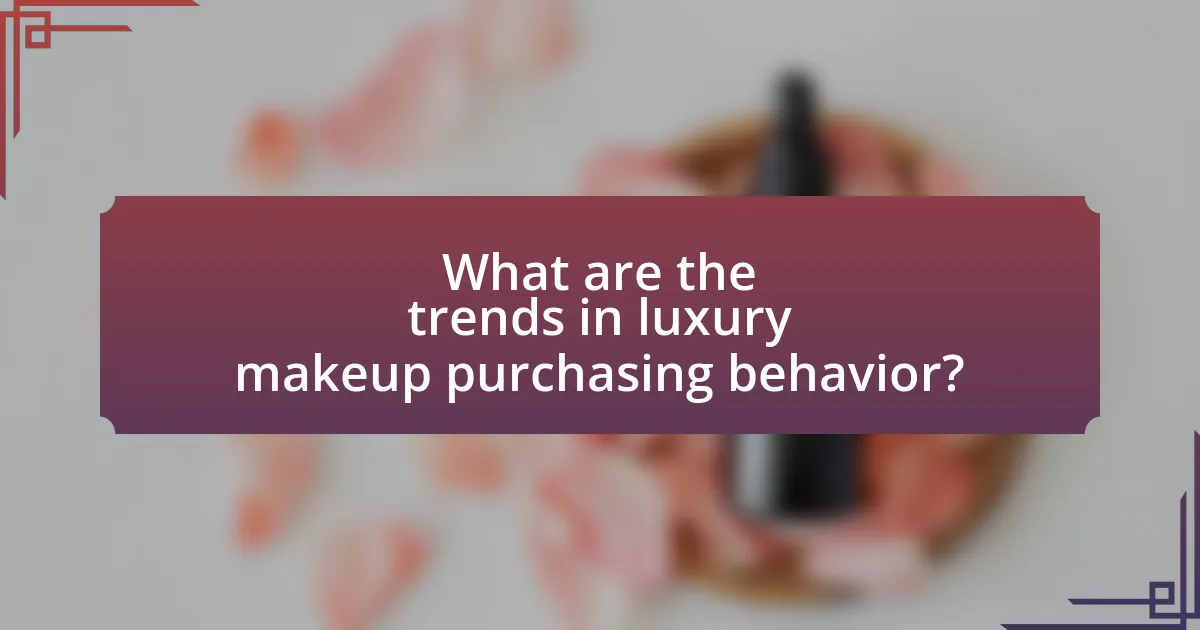
What are the trends in luxury makeup purchasing behavior?
Trends in luxury makeup purchasing behavior indicate a growing preference for online shopping, with 30% of consumers opting for e-commerce platforms over traditional retail. This shift is driven by convenience, a wider selection, and the influence of social media marketing. Additionally, there is an increasing demand for sustainable and ethically sourced products, with 70% of luxury consumers expressing a willingness to pay more for brands that prioritize environmental responsibility. Personalization is also a key trend, as brands leverage data analytics to offer tailored recommendations, enhancing customer engagement and loyalty.
How has consumer behavior shifted in recent years regarding luxury makeup?
Consumer behavior regarding luxury makeup has shifted towards a greater emphasis on sustainability, inclusivity, and digital engagement. Recent studies indicate that consumers are increasingly prioritizing brands that demonstrate ethical practices and environmental responsibility, with 67% of consumers willing to pay more for sustainable products. Additionally, the rise of social media influencers has transformed purchasing decisions, as 49% of consumers report being influenced by social media when buying luxury makeup. This shift reflects a broader trend where consumers seek authenticity and connection with brands, leading to a more informed and engaged customer base.
What demographic factors influence luxury makeup purchasing trends?
Demographic factors that influence luxury makeup purchasing trends include age, income level, gender, and geographic location. Younger consumers, particularly millennials and Gen Z, are increasingly driving luxury makeup sales, as they prioritize brand authenticity and social media influence. High-income individuals are more likely to purchase luxury makeup, with a 2021 report indicating that consumers with an annual income above $100,000 account for a significant portion of luxury beauty sales. Gender also plays a role, as women remain the primary consumers of luxury makeup, although there is a growing market for male grooming products. Additionally, geographic location affects purchasing behavior, with urban areas showing higher demand for luxury beauty products compared to rural regions, as urban consumers often have greater access to luxury brands and trends.
How do economic conditions affect luxury makeup sales?
Economic conditions significantly influence luxury makeup sales, as consumer spending power directly correlates with purchasing behavior. During periods of economic growth, consumers tend to have higher disposable incomes, leading to increased demand for luxury makeup products. For instance, a report from Statista indicated that the global luxury cosmetics market was valued at approximately $50 billion in 2021, reflecting a rise during economic upturns. Conversely, during economic downturns, such as recessions, consumers often prioritize essential goods over luxury items, resulting in decreased sales for high-end makeup brands. Historical data from the 2008 financial crisis showed a notable decline in luxury goods sales, including cosmetics, as consumers tightened their budgets. Thus, economic conditions play a crucial role in shaping the luxury makeup market dynamics.
What are the emerging preferences among luxury makeup consumers?
Emerging preferences among luxury makeup consumers include a strong inclination towards clean beauty products, personalized experiences, and sustainability. Research indicates that 70% of luxury consumers prioritize products with natural ingredients, reflecting a shift towards health-conscious choices. Additionally, personalized services, such as custom formulations and tailored shopping experiences, are increasingly sought after, with 60% of consumers expressing a desire for bespoke options. Sustainability is also a key factor, as 65% of luxury makeup buyers prefer brands that demonstrate environmental responsibility through eco-friendly packaging and ethical sourcing. These trends highlight a significant evolution in consumer values, emphasizing health, individuality, and environmental consciousness in luxury makeup purchases.
How is sustainability influencing luxury makeup purchases?
Sustainability is significantly influencing luxury makeup purchases by driving consumer preferences towards brands that prioritize eco-friendly practices. Research indicates that 66% of global consumers are willing to pay more for sustainable brands, reflecting a growing demand for environmentally responsible products in the luxury sector. This shift is evident as luxury makeup brands increasingly adopt sustainable sourcing, biodegradable packaging, and cruelty-free testing methods, aligning their offerings with consumer values. For instance, brands like Gucci Beauty and Dior have launched initiatives focused on sustainability, which has positively impacted their sales and brand loyalty among environmentally conscious consumers.
What role does personalization play in luxury makeup buying decisions?
Personalization significantly influences luxury makeup buying decisions by enhancing customer engagement and satisfaction. When brands offer tailored experiences, such as customized product recommendations based on individual preferences and skin types, they create a deeper emotional connection with consumers. Research indicates that 80% of consumers are more likely to purchase from a brand that offers personalized experiences, highlighting the importance of this strategy in driving sales. Furthermore, luxury brands that utilize data analytics to understand customer behavior can effectively curate their offerings, leading to increased loyalty and repeat purchases.
What practical tips can consumers consider when purchasing luxury makeup?
When purchasing luxury makeup, consumers should prioritize researching product ingredients and brand reputation. Understanding the formulation helps ensure that the products meet personal skin needs and preferences, while a reputable brand often signifies quality and ethical practices. Additionally, consumers should consider testing products in-store to assess texture and color match, as luxury items often have a higher price point, making it essential to ensure satisfaction before purchase. According to a study by the Journal of Consumer Research, consumers are more likely to invest in luxury products when they feel confident in their choices, highlighting the importance of informed decision-making in luxury purchases.
How can consumers identify genuine luxury products?
Consumers can identify genuine luxury products by examining the quality of materials, craftsmanship, and brand reputation. Authentic luxury items are typically made from high-quality materials, such as genuine leather or fine fabrics, and exhibit superior craftsmanship, including precise stitching and attention to detail. Additionally, established luxury brands often have a long history and a strong reputation for quality, which can be verified through research and consumer reviews. For example, brands like Chanel and Louis Vuitton have been recognized for their commitment to quality and exclusivity, making them benchmarks for genuine luxury.
What strategies can help consumers make informed luxury makeup purchases?
Consumers can make informed luxury makeup purchases by researching product ingredients, reading reviews, and understanding brand values. Researching ingredients helps consumers identify potential allergens or harmful substances, ensuring safety and compatibility with their skin. Reading reviews from credible sources or fellow consumers provides insights into product performance and satisfaction levels, guiding purchasing decisions. Additionally, understanding brand values, such as sustainability practices or ethical sourcing, allows consumers to align their purchases with their personal beliefs, enhancing the overall satisfaction of their luxury makeup investments.
